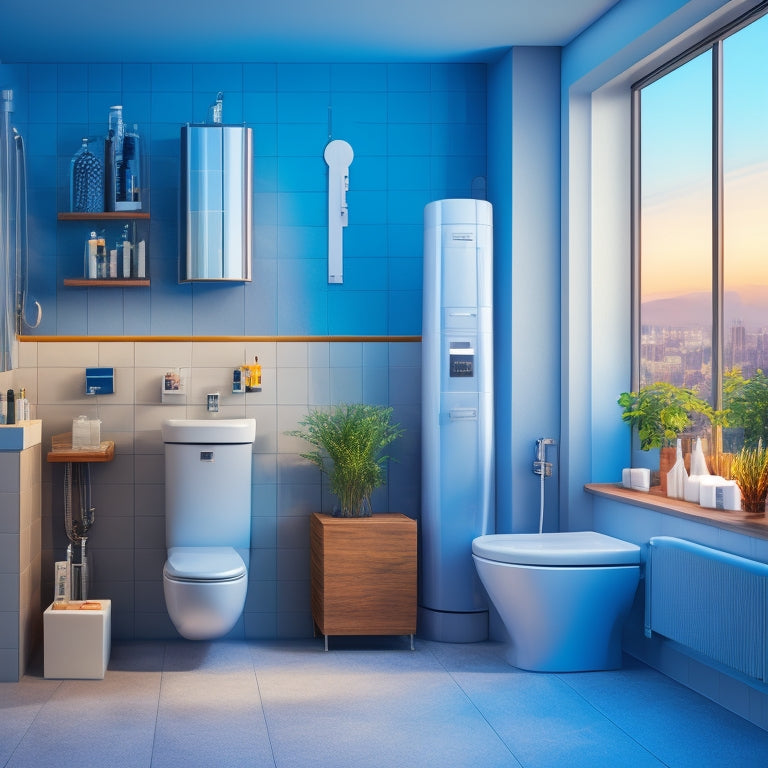
Heat Pump Water Heater: Installation Costs Explained
Share
You'll need to budget around $3,000 to $5,000 for a heat pump water heater installation, considering the unit cost, labor fees, permits, and inspections, which can vary depending on your location, job complexity, and necessary upgrades. This total includes the heat pump unit itself, which ranges from $800 to $2,000, as well as labor costs that can range from $500 to $2,000, depending on the installer's qualifications and the installation's complexity. Additionally, you'll need to factor in permits and inspection fees, which can add up to $1,000. With all these components, it's important to understand each cost to make an informed decision about your investment, and there's more to investigate when it comes to optimizing your heat pump water heater installation.
Key Takeaways
- The total upfront cost of a heat pump water heater installation includes labor, permits, and inspections, with costs varying by job complexity and location.
- Equipment and material costs range from $1,300 to $3,500, including the heat pump unit, storage tank, and additional features like timers and sensors.
- Labor and installation fees depend on installation complexity and installer qualifications, with costs ranging from $500 to $2,000 and labor rates from $75 to $200 per hour.
- Permits and inspection charges vary by jurisdiction, with several permits required, including electrical, plumbing, and building permits, and inspection fees ranging from $50 to $500.
- Incentives and rebates are available from government and utility companies to offset installation costs, including federal tax credits, state rebates, and utility financing options.
Initial Investment Breakdown
When calculating the total upfront cost of a heat pump water heater installation, it's essential to break down the initial investment into its constituent parts.
You'll want to take into account the labor costs associated with the installation, which can vary depending on the complexity of the job and the location. Additionally, permits and inspections will add to the overall cost.
It's also vital to factor in the cost of any necessary electrical or plumbing upgrades.
Moreover, incorporating fast charging infrastructure and energy storage systems can enhance grid resiliency and optimize charging efficiency, which may also impact the overall cost.
By understanding these individual components, you can make an informed decision about the installation.
Equipment and Material Costs
During the planning phase of your heat pump water heater installation, you'll need to reflect on the equipment and material costs, which can vary widely depending on the specific components you choose.
Understanding recycling costs overview is vital for financial planning and regulatory compliance. These costs will impact your overall energy efficiency and system lifespan.
Some essential components to evaluate include:
- The heat pump water heater unit itself, which can range from $800 to $2,000
- A suitable storage tank, which can add another $300 to $1,000
- Additional features like timers, thermostats, and sensors, which can add up to $500
- Necessary plumbing materials, such as pipes and fittings, which can cost around $200 to $500
Labor and Installation Fees
You've accounted for the equipment and material costs, now it's time to factor in the labor and installation fees that will bring your heat pump water heater system to life.
The labor costs will depend on the complexity of the installation, the installation timeline, and the labor qualifications of the installer. Installation costs for commercial EV charging stations, such as Level 2 Charging Stations, can range from $500 to $2,000, highlighting the importance of considering labor proficiency in budget planning.
A typical installation may require 2-5 hours of labor, depending on the system's complexity and the installer's experience. The labor rate can range from $75 to $200 per hour, depending on the location and the installer's qualifications.
A licensed plumber or electrician with experience in heat pump water heater installations is recommended to guarantee a safe and efficient installation.
Permits and Inspection Charges
You'll need to obtain several permits before installing a heat pump water heater, including electrical, plumbing, and building permits.
The specific permits required vary by jurisdiction, so you'll need to check with your local authorities for a thorough list.
Land acquisition and site preparation costs, similar to those of EV charging infrastructure, can also impact the overall installation cost.
Inspection fees, which can range from $50 to $500, will also be incurred to guarantee compliance with local building codes and regulations.
Required Permits List
When installing a heat pump water heater, obtaining the necessary permits is an important step to guarantee compliance with local building codes and regulations.
You'll need to secure permits that align with your installation regulations, making certain your new system meets the required standards. Typically, you'll need to obtain:
- Electrical permit: Covers the connection of the heat pump water heater to your electrical system
- Plumbing permit: Verifies the installation meets local plumbing codes and regulations
- Building permit: Confirms the installation complies with local building codes and zoning ordinances
- Environmental permit: May be required in areas with specific environmental regulations or restrictions.
Additionally, it's vital to investigate federal and state tax incentives to reduce the overall cost of installation, and to evaluate the benefits of utility discounts and time-of-use pricing to optimize energy consumption.
Inspection Fee Breakdown
Typically, three to five inspections are required to confirm a heat pump water heater installation meets local building codes and regulations.
You'll need to factor in the inspection fee breakdown, which includes the cost of each inspection and the inspector's qualifications.
The inspection process involves a thorough examination of the installation to guarantee it meets safety and performance standards.
Inspectors with specialized qualifications, such as those certified by the International Association of Plumbing and Mechanical Officials (IAPMO), may charge higher rates.
On average, inspection fees range from $50 to $200 per inspection, depending on the complexity of the installation and the inspector's proficiency.
Be prepared to pay around $250 to $1,000 for the entire inspection process, depending on the number of inspections required.
Incentives and Rebate Opportunities
Government agencies and utility companies offer a variety of incentives and rebate opportunities to encourage the adoption of heat pump water heaters, which can greatly offset the upfront installation costs.
You can take advantage of these incentives to reduce your financial burden and enjoy the long-term savings and environmental benefits of heat pump water heaters.
Some of the incentives you may be eligible for include:
- Federal incentives, such as tax credits, to offset a portion of the installation costs
- State rebates for energy-efficient upgrades, including heat pump water heaters
- Financing options through utility programs, offering low-interest loans or on-bill financing
- Utility rebates for customers who install energy-efficient heat pump water heaters
Ongoing Maintenance Expenses
During its lifespan, your heat pump water heater will require regular maintenance to guarantee peak performance and efficiency. This includes tasks like cleaning the air filter, checking the refrigerant charge, and inspecting the electrical connections. These tasks will help maintain your system's energy efficiency and extend its system longevity.
| Task | Frequency |
|---|---|
| Clean air filter | Every 1-2 months |
| Check refrigerant charge | Every 6-12 months |
| Inspect electrical connections | Every 12 months |
| Descale the heat exchanger | Every 12-24 months |
Frequently Asked Questions
Can I Install a Heat Pump Water Heater Myself?
You're a DIY genius, but installing a heat pump water heater solo is a challenging task! While it's technically possible, safety considerations are paramount, and a single misstep could be catastrophic; it's recommended to leave it to the pros for a hassle-free, worry-free experience.
Are Heat Pump Water Heaters Suitable for Cold Climates?
You're wondering if heat pump water heaters are suitable for cold climates. Yes, they can be, but you'll need to prioritize high efficiency ratings and meet specific installation requirements to guarantee peak performance in freezing temperatures.
Do Heat Pump Water Heaters Work With Existing Plumbing?
As you venture into the world of heat pump water heaters, you'll find they're like a chameleon adapting to new environments - they can work with your existing plumbing, but you'll need to verify compatibility and meet specific installation requirements to access their full potential.
Can I Use a Heat Pump Water Heater With a Septic System?
You're wondering if a heat pump water heater is compatible with your septic system; the good news is that it can work harmoniously, leveraging energy efficiency to reduce your eco-footprint, while also respecting your septic system's delicate balance.
Are Heat Pump Water Heaters Noisy During Operation?
You'll be relieved to know that, like the quiet hum of a Toyota Prius, heat pump water heaters typically operate at 40-50 decibels, ensuring minimal disruption to your daily routine while maintaining ideal noise levels and operational efficiency.
Related Posts
-

10 Best WiFi Outlets for Tracking Home Energy Usage
You can optimize your home's energy usage with the right WiFi outlets, which provide real-time monitoring and control...
-

How to Upgrade Your Home With Geothermal Innovations
You're now on the cusp of utilizing the Earth's natural thermal energy to revolutionize your home's heating and cooli...
-

3 Green HVAC Filters for Solar-Powered Homes
When outfitting your solar-powered home with an HVAC system, you'll want to choose filters that align with your commi...


